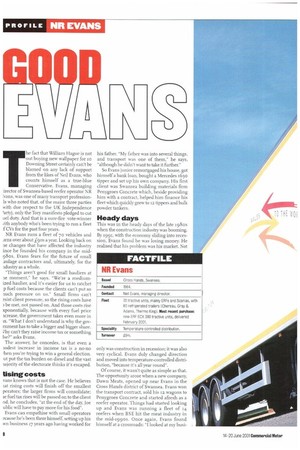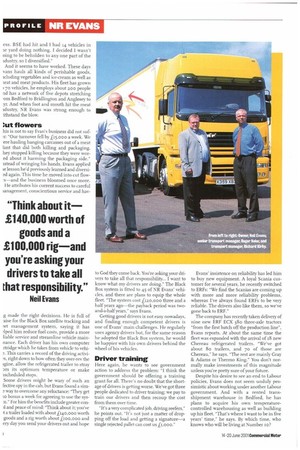T he fact that William Hague is not out buying new
Page 38

Page 40

If you've noticed an error in this article please click here to report it so we can fix it.
wallpaper for co Downing Street certainly can't be blamed on any lack of support from the likes of Neil Evans, who counts himself as a true-blue Conservative. Evans, managing .irector of Swansea-based reefer operator NR '.vans, was one of many transport professionls who noted that, of the major three parties with due respect to the UK Independence 'arty), only the Tory manifesto pledged to cut uel duty. And that is a sure-fire vote-winner iith anybody who's been trying to run a fleet f CVs for the past four years.
NR Evans runs a fleet of 70 vehicles and arns over about £9m a year. Looking back on ae changes that have affected the industry ince he founded his company in the mid980s. Evans fears for the future of small .aulage contractors and, ultimately, for the lclustry as a whole.
"Things aren't good for small hauliers at ae moment," he says. "We're a mediumized haulier, and it's easier for us to ratchet p fuel costs because the clients can't put so auch pressure on us." Small firms can't esist client pressure, so the rising costs have ) be met, not passed on. And those costs rise xponentially, because with every fuel price lcrease, the government takes even more in ix. "What I don't understand is why the govtnment has to take a bigger and bigger share. Vhy can't they raise income tax or something me?" asks Evans.
The answer, he concedes, is that even a iodest increase in income tax is a no-no then you're trying to win a general election. ut put the tax burden on diesel and the vast lajority of the electorate thinks it's escaped.
Using costs
vans knows that is not the case. He believes cat rising costs will finish off the smallest perators; the larger firms will consolidate; ie fuel tax rises will be passed on to the client rid, he concludes, "at the end of the day, Joe ublic will have to pay more for his food". Evans can empathise with small operators ecause he's been there himself, setting up his vvn business 17 years ago having worked for his father. "My father was into several things, and transport was one of them," he says, "although he didn't want to take it further."
So Evans junior remortgaged his house, got himself a bank loan, bought a Mercedes 1630 tipper and set up his own company. His first client was Swansea building materials firm Penygroes Concrete which, beside providing him with a contract, helped him finance his fleet which quickly grew to 12 tippers and bulk powder tankers,
Heady days
This was in the heady days of the late 1980s when the construction industry was booming. By 1991, with the economy sliding into recession, Evans found he was losing money. He realised that his problem was his market. Not only was construction in recession; it was also very cyclical. Evans duly changed direction and moved into temperature-controlled distribution, "because it's all year round".
Of course, it wasn't quite as simple as that. The opportunity arose when a new company, Dawn Meats, opened up near Evans in the Cross Hands district of Swansea. Evans won the transport contract, sold his 12 wagons to Penygroes Concrete and started afresh as a reefer operator. Things had started looking up and Evans was running a fleet of 14 reefers when BSE hit the meat industry in the mid-i 99os. Once again, Evans found himself at a crossroads: "I looked at my busi
ess. BS E had hit and I had 14 vehicles in le yard doing nothing. I decided I wasn't oing to be beholden to any one part of the idustry, so I diversified."
And it seems to have worked. These days vans hauls all kinds of perishable goods, Kluding vegetables and ice-cream as well as ieat and meat products. His fleet has grown ) 70 vehicles, he employs about zoo people ad has a network of five depots stretching :om Bedford to Bridlington and Anglesey to yr. And when foot and mouth hit the meat idustry, NR Evans was strong enough to ithstand the blow.
:ut flowers
his is not to say Evan's business did not sufT: "Our turnover fell by £15,000 a week. We ere hauling hanging carcasses out of a meat [ant that did both killing and packaging. hey stopped killing because they were wored about it harming the packaging side." istead of wringing his hands, Evans applied ie lesson he'd previously learned and diversied again. This time he moved into cut flow-s—and the business bloomed once more. He attributes his current success to careful ianagement, conscientious service and hay
g made the right decisions. He is full of :aise for the Black Box satellite tracking and !et management system, saying it has !Iped him reduce fuel costs, provide a more liable service and streamline vehicle mainnance. Each driver has his own computer rtridge which he takes from vehicle to vehi!. This carries a record of the driving activis, right down to how often they over-rev the igine, allow the refrigerated trailer to stray 31/1 its optimum temperature or make ischeduled stops.
Some drivers might be wary of such an fective spy in the cab, but Evans found a sime way to overcome any reluctance: "They get o bonus a week for agreeing to use the sysxi." For him the benefits include greater con)1 and peace of mind: "Think about it; you've rt a trailer loaded with about Li4o,000 worth goods and a rig worth about Lroo,000 and ery day you send your drivers out and hope to God they come back. You're asking your drivers to take all that responsibility... I want to know what my drivers are doing." The Black Box system is fitted to 45 of NR Evans' vehicles, and there are plans to equip the whole fleet. "The system cost £120,000 three and a half years ago—the payback period was twoand-a-half years," says Evans.
Getting good drivers is not easy nowadays, and finding enough competent drivers is one of Evans' main challenges. He regularly uses agency drivers but, for the same reason he adopted the Black Box system, he would be happier with his own drivers behind the wheel of his vehicles.
Driver training
Here again, he wants to see government action to address the problem: "I think the government should be offering a training grant for all. There's no doubt that the shortage of drivers is getting worse. We've got three people dedicated to driver training; we pay to train our drivers and then recoup the cost from them over time.
"It's a very complicated job, driving reefers," he points out. "It's not just a matter of dropping off the load and getting a signature—a single rejected pallet can cost us Zr,000." Evans' insistence on reliability has led him to buy new equipment. A loyal Scania customer for several years, he recently switched to ERFs: "We find the Scanias are coming up with more and more reliability problems, whereas I've always found EREs to be very reliable. The drivers also like them, so we've gone back to ERF."
The company has recently taken delivery of nine new ERF ECX 380 three-axle tractors from the first batch off the production line", Evans reports. At about the same time the fleet was expanded with the arrival of 18 new Chereau refrigerated trailers. "We've got about go trailers, and 70 of those are Chereau," he says. "The rest are mainly Gray & Adams or Thermo King." You don't normally make investments of this magnitude unless you're pretty sure of your future.
Despite his desire to see an end to Labour policies, Evans does not seem unduly pessimistic about working under another Labour government. And with a rented transshipment warehouse in Bedford, he has plans to acquire his own temperaturecontrolled warehousing as well as building up his fleet. "That's where I want to be in five years' time," he says. By which time, who knows who will be living at Number io?
































































































